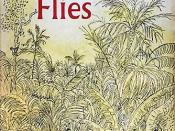A fable, by strict definition, is a short tale conveying a clear moral lesson in which the characters are animals acting like human beings. A fable is intended to provide moral instruction and its characters and scenes are drawn to suit this purpose. William Golding has referred to his novel, Lord of the Flies, as a fable. This essay will demonstrate that in the moral lessons it offers us and in the symbolic nature of its setting, characters and literary devices, the novel functions as a fable for the inherent tendency in man to revert to primal savagery once he is removed from civilization. We are left with the caution that evil must be acknowledged and consciously opposed.
The novel's status as a fable is demonstrated strongly through the moral lesson it presents to his responders. Golding's message is dark one, emphasizing the bleaker aspects of human nature. Rejecting the conventional, romantic notions that man 'is basically noble', Golding insists that evil is inherent in man.
Indeed, Golding would say that the central idea behind the Lord of the Flies is that man is fallen from grace. He would go on to state that once the façade of civilization is stripped away, man is fundamentally motivated in his behaviour by primal and brutal instincts. Evil is a force which is instinctive in man, which must be recognized and controlled.
Golding's message for the inherent tendency in man to revert to primal savagery once he is removed from civilization is presented through the boy's gradual loss of order and descent into savagery. When the boys conduct their first meeting on the island they establish rules and methods of proper conduct. Ralph is elected by the boys as Chief and a democratic 'political' system is established. The boys are excited at the...



Nice
This is really nice. It helped me out a lot
0 out of 0 people found this comment useful.